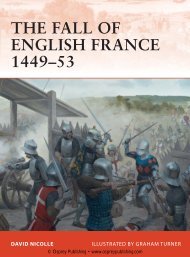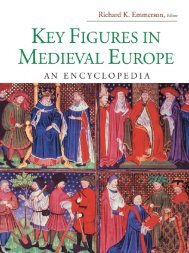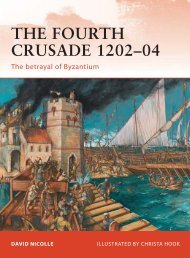Osprey - General Military - Knight - The Warrior and ... - Brego-weard
Osprey - General Military - Knight - The Warrior and ... - Brego-weard
Osprey - General Military - Knight - The Warrior and ... - Brego-weard
Create successful ePaper yourself
Turn your PDF publications into a flip-book with our unique Google optimized e-Paper software.
Given these apparent similarities it should not be surprising that scholars have<br />
generally chosen to translate the term 'equestrian' as 'knight'. One should not stretch<br />
the comparison too far, however. In spite of the similarities between them the<br />
equestrian class of Rome was not the same as the medieval knightly class, nor was<br />
the one to evolve into the other. <strong>The</strong> armies of Rome through to the sixth century<br />
comprised st<strong>and</strong>ing forces of more or less professional, paid soldiery. <strong>The</strong> equestrian<br />
class was a small part of these forces, providing the officer cadre. By comparison, the<br />
armies of the high middle ages (the period in which our knights become dominant)<br />
were not permanent organizations nor were the warriors full-time, paid soldiers.<br />
Furthermore, the knight was a significant part, both in numbers <strong>and</strong> importance, of<br />
those armies. <strong>The</strong>re is, then, a discontinuity between the military of the Roman period<br />
<strong>and</strong> that of the middle ages. In order to find the origins of our medieval knight we<br />
must look to the development of the post-Roman barbarian' kingdoms.<br />
Through the fourth, fifth <strong>and</strong> sixth centuries it became increasingly difficult to<br />
recruit troops for the Roman army, especially following its expansion under the rule<br />
of the Tetrarchy, when power was shared (uneasily) between two 'emperors' <strong>and</strong> two<br />
Caesars'. Increasing numbers of citizens acquired exemption from military service<br />
<strong>and</strong> the shortfall was made up by recruiting barbarian peoples from beyond the<br />
frontiers: individuals, war b<strong>and</strong>s, even whole tribes. <strong>The</strong> army became divorced from<br />
the civilian government <strong>and</strong> population, subject to its own laws <strong>and</strong> the jurisdiction<br />
of its comm<strong>and</strong>ers. It sought to differentiate itself from the population of the region<br />
in which it was stationed by taking on the cultural identity of the barbarian troops<br />
who had been recruited for it. As the western empire fell apart, these 'barbarized'<br />
units became the basis of new regional identities <strong>and</strong> their comm<strong>and</strong>ers, the majority<br />
of whom were of barbarian origins, became kings of peoples <strong>and</strong> settled their<br />
followers in the territories they governed. <strong>Military</strong> service <strong>and</strong> barbarian ethnicity<br />
became synonymous; to be (for the sake of example) Frankish was to be a warrior,<br />
<strong>and</strong> conversely to be a warrior was to be Frankish (or Lombard, Goth, V<strong>and</strong>al <strong>and</strong><br />
so on). 'Barbarians' fought, 'Romans' paid taxes. This ethnicity <strong>and</strong> martial status<br />
became hereditaiy, with the sons of Franks or Goths being themselves considered<br />
Franks or Goths <strong>and</strong> inheriting the status, l<strong>and</strong>, martial obligations <strong>and</strong> privileges of<br />
their fathers.<br />
During the seventh <strong>and</strong> eighth centuries the ethnic, 'barbarian' identities that had<br />
differentiated between the warrior <strong>and</strong> civilian populations were adopted by free men,<br />
the l<strong>and</strong>holding class, who thereby gained the exemptions from taxation <strong>and</strong> the legal<br />
<strong>and</strong> political privileges but also the liability for military service that went with<br />
barbarian ethnicity. Those free men who did not re-br<strong>and</strong> themselves in this way lost<br />
their freedom <strong>and</strong> became dependants of the barbarian' elite. As a result the social







